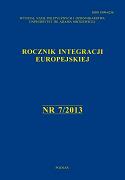G-8 czy G-8,5? Uwagi na temat uczestnictwa Unii Europejskiej w grupie ośmiu
G-8 or G-8.5? Comments on the European Union’s participation in the G-8
Author(s): Marek RewizorskiSubject(s): Politics / Political Sciences
Published by: Uniwersytet Adama Mickiewicza
Keywords: polityka zagraniczna UE; G-8
Summary/Abstract: This paper examines the issue of the EU’s representation in the G-8 and the role the European Commission plays in this context. It makes two hypotheses: one is that both the EU, which is formally treated as a state in the G-8, and the Commission, which is a separate, supranational agent of member states, are independent and to a certain extent also politically and legally equal G-8 members. The other one assumes that, owing to the Commission’s independent role, the G-8 is actually a G-8.5 and in the near future it may be considered to be a G-9, as the roles of the Commission and the President of the European Council are separated. Increased participation of the Commission and the European Council in the G-8 in the future may marginalize the state holding the rotational presidency of the Council and needlessly reinforce the already strong EU representation in the G-8. Over several years this may result in undermining the mission of the G-8, or to reducing its role to that of „COREPER G20,” which is an auxiliary body debating over the issues of little significance and controversy for the BRIC countries and other non-Western members of the G-20. The considerations on the EU’s representation in the G-8 and increased importance of the Commission are conducted on the basis of the principal-agent theory and delegation theory. Reference is also made to the post-Lisbon representation model, where the Commission – formerly not challenged in the G-8 by the presidency – finds a new competitor, i.e. the European Council.
Journal: Rocznik Integracji Europejskiej
- Issue Year: 2013
- Issue No: 7
- Page Range: 75-96
- Page Count: 22
- Language: Polish

